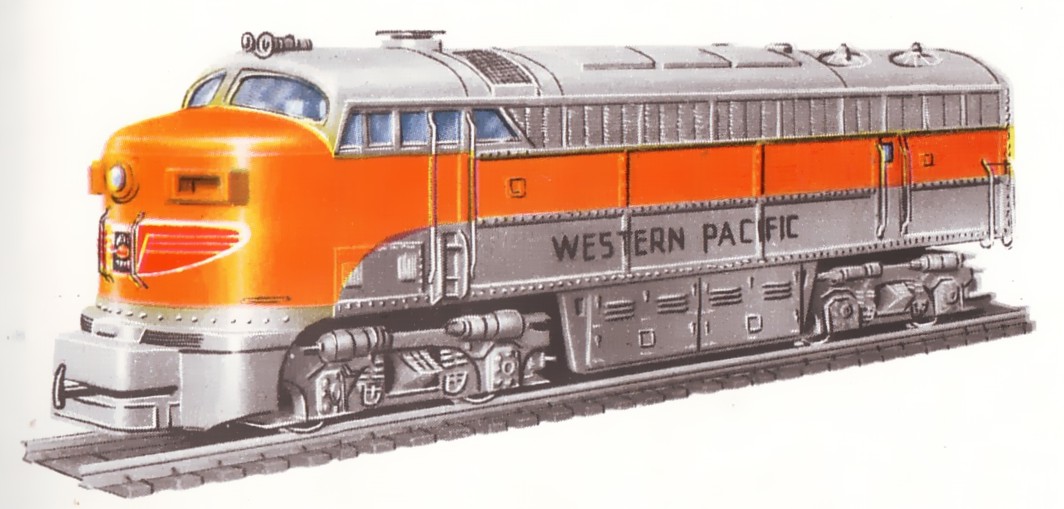

Diesel Locomotive Fairbanks-Morse C-Liner

Fairbanks-Morse starter to design and put into production a diesel locomotive for long distance in 1949, after years of production of only smaller diesel shunters.
The project of the C-Liner was one of these tasks, with a multiple choice of engine sizes available, in the range of 1600, 2000, o 2400 Hp
This was the main contributing factor which gave to the C-Liner it’s classification, taken from the Consolidation Lines official classification of the Loco.
Even though one of the smallest companies building diesel locos, Fairbanks-Morse designed and built some of the most important locomotives of that time, most appreciated by the actual drivers, but also by other operational staff that worked on them.

One of the first American Diesel Locomotives built by Rivarossi.
This model was originally sold in two parts: Unit A (with drivers cab side to one above) + Unit B (without cab). Latterly it was also sold separately.
A version with a mounted working train horn, was also produced.
Today this is quite a rare model.
Produced by Rivarossi from 1952 till 1971
With the liveries of the following companies: Southern Pacific, Union Pacific, New Haven, Pennsylvania, Santa Fe, Western Pacific, Illinois Central, Chicago North Western, Monon Route, Texas Pacific, Pere Marquette, Minneapolis & St. Louis, Wabash,
The Fairbanks-Morse C-Liner
(by Gianni Carrara)
This locomotive was a milestone of the history of Rivarossi production, firstly because it was one of the first locos produced in plastic injection mould, and also because its production lasted for many years, in a multitude of liveries.
Notes on the prototype
Contrary to what written by Rivarossi, the 2400 HP version was on the F M catalogue, but never put into production.
The engine of the C-liners both on the cab or booster units were equipped with 1,600 hp, 2,000 hp, or 2,400 hp 8, 10, or 12 Cylinder in an opposed in line piston configuration. These engines were well tested and used by the US Navy in their Sub fleet.
This Loco must not be confused with a similar “passenger” version which has the same body, but is distinguishable by the different mounted front bogie with A1A configuration, This model of Locomotive was produced by Rivarossi for the American Atlas company in N gauge.
The Rivarossi production run.
Rivarossi produced this loco in both motorized unit A with drivers cabin and in the version without motor Unit B with no drivers cab, offering through the years various different models, the history of such a production run is as follows:
The A FM/R: is the very first model, a unit A in grey and orange livery of the Western Pacific (1952 ?).
A FM/T: unit A, grey and orange, Western Pacific.
A FM/ST: unit A, red and grey, Southern Pacific.
A FM/CT: unit A, yellow and green, Chicago North Western.
A FM/TT: in light blue and white, Texas and Pacific.
A FM/MT: in okra and black, Monon.
These 5 models were also equipped with the possibility to link a non powered unit B and can be recognised by the presence of two small jacks on the front which allowed for the power to be carried from Unit A to Unit B
The B units were denominated A FM/B and were available in identical livery of their sister Unit A.
(Out of curiosity I would like to know if these B units were all really produced, in all the models available on catalogue.)
A FM W/AB: Unit A and B of the Wabash, in grey and blue.
A FM I/AB: Unit A and B of the Illinois Central, in Okra, orange and yellow.
These two models I have only seen them on the cover of the HO Rivarossi magazine, I do not think they were ever produced, or at least never seen on the Italian market.
A FM SF/R – 1884: Unit A, B, and additional non powered A unit in red and Silver of the Santa Fe. (1959).
This is the only triple composition set, Unit B has mounted a working train horn (Rivarossi called it optimistically a siren) which was powered by a battery and was activated when the loco passed over a specially designed piece of track.
At the same period Rivarossi presented a set comprising of Unit A and B plus 4 passenger carriages.
A FM UP/R – 1883: Unit A and B of the in the colours black and yellow of the Union Pacific. (1959). Unit B had working train horn.
A FM PM/R – 1882: Unit A in blue and yellow of the Pere Marquette. (1959).
1886: Set Unit A and B in red and grey of the Southern Pacific. Unit B had working train horn.
1885: Unit A in light blue and white of the Texas and Pacific.
1893: Set Unit A and B in black and white New Haven. Not sure if this model had train horn or not.
1894: Unit A in black and yellow of the Union Pacific.
1820: Set Unit A and B in red and Silver of the Santa Fe. Unit B had working train horn.
1815: Set Unit A and B in brown and yellow of the Pennsylvania. Unit B had working train horn.
11888H: Unit A in red and white of the Minneapolis & St. Louis. This model was only available in non motorized in a ready to build kit of the serried TrenoHobby It could be motorized with art 6309.
Note: Even though the were a great variety of liveries available, in reality only the Pennsylvania Railroad has such Locos in use, with a total of 16 unit A e 8 Unit B usually run in triplets.